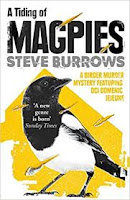Mindfulness and Crime Fiction
There are many sub genres of crime fiction, from noir to
historic, from cosy crime to police procedurals and psychological thrillers.
Today I want to talk of a specific approach to solving crime and some well
known sleuths from past and present who use this technique. I’m not talking
about an intellectual approach to solving crime, as used by say Sherlock Holmes
or Lord Peter Wimsey and Harriot Vane, rather a contemplative one.
I can’t remember how many crime novels I’ve read in my life,
but some images have settled into my wholly inadequate memory. I don’t need to
close my eyes to see Nero Wolfe tending his orchids or Mma Precious Ramotswe
sitting on her porch drinking bush tea and watching the sun go down. For those
who would like to indulge in some vintage crime classics, Nero Wolfe is an
eccentric sleuth created in the 1930s and onward by American mystery writer Rex
Stout.
I can’t remember anything about any of the Nero Wolfe books I so enjoyed reading, except this image: Nero standing in the orchid greenhouse
of his New York brownstone apartment, solving crimes without having the need or
desire to ever venture forth. It’s a calming image, one that reminds me that we
don’t always need adrenaline-fueled excitement to be happy. Nero, perhaps not
even a good man, was a contemplative. His genius at solving crimes did not come
from a snappy intellect, although he was sharp enough, but from a different way
of looking at the world, its people and the forces of evil that drive crime.I have the same memory trigger with Alexander McCall Smith’s books, The No. 1 Ladies’ Detective Agency. Just visualising Precious sitting on her porch relaxes me, empties my mind of thoughts and words and helps me to focus. Nowadays we call this mindfulness. If you are a proponent of mindfulness you might now say that it’s tapping into the greater consciousness by emptying your mind that brings the solutions to these puzzles.
I’m still undecided if
Miss Marple counts as a practitioner of mindfulness. I can clearly see her
sitting there knitting, not rushing about grasping at answers, but waiting
patiently. Certainly not Poirot, for as we all know, he was a champion of the
little grey cells.
The French detective Maigret fits the mindfulness bill for
me. The author Simenon says so much with such few words. The plot structure isn't complex - Maigret usually deals with one case at a time, and spends plenty of time
sitting in cafes or enjoying a Parisian meal and a glass of wine or something.
Ask any British or North American police inspector if they have time for lunch
dates or drinks, and they will fall about laughing. Maigret likes to go fishing
too. Fishing is a contemplative occupation, one conducive to clearing the mind.
The best solutions arise when one isn’t looking for them. I challenge anyone to
sit on the banks of a river with a fishing rod for half a day or more and still
feel frantic. I have just finished reading the latest Georges Simenon
re-release, Maigret’s Anger, (published by Penguin October 2018 in paperback,
£7.99). It’s about the murder of an owner of a Montmartre nightclub and
very enjoyable. I suppose smoking a pipe could aid contemplation, but crime authors don’t pose for their publicity shots with a pipe in
the mouth anymore.
And now to the book that triggered this piece in the first
place. A Tiding of Magpies by Steve Burrows, first published by Point Blank in
September 2018 in paperback (£8.99). The main protagonist is a Canadian
Detective Chief Inspector who serves in Norfolk and likes, no loves,
bird watching. Each of the four previous books in the series also have titles
involving a particular type of bird. You might think, gosh bird watching, how dull. And
if the British author Steve Burrows should happen to read this review, I
apologize for even suggesting that some people might find bird watching boring,
especially as he himself is an expert birdwatcher of considerable pedigree. I
determined to read the book, taking any birding in my stride, when I soon
realized that the prose had a certain quality to it. A contemplative quality, a
way of looking beneath the surface of things. Soon I was engrossed. Not in an
edge of the seat kind of thriller excitement way, but in the mindfulness approach
portrayed by our hero Jejeune. It reminded me of a few other well-known
sleuths, and there you have it.
I happen to love birds and have had the deeply
moving experience of a rook leaving a little pile of green shards by my back
door where I feed the birds, but I’m not a proper birdwatcher and know very
little about birds. I have no trouble imagining though that it’s a
contemplative past time, one that slows down the over-active mind and helps it
to zero in like a cruise missile on a complex problem. Yes, Jejeune is clever,
but is so much more than that. He is mindful. By the way, it’s not all about
birds, but involves murder, current affairs, corruption, buried secrets and a
harrowing cold case. In years from now, I will probably have forgotten the
interesting plot and even perhaps the well-drawn cast of characters, but I will
never forget that special thing that I now know about Magpies.






Comments
Post a Comment
Thank you for your comment. It will now be placed in a moderation queue for approval.